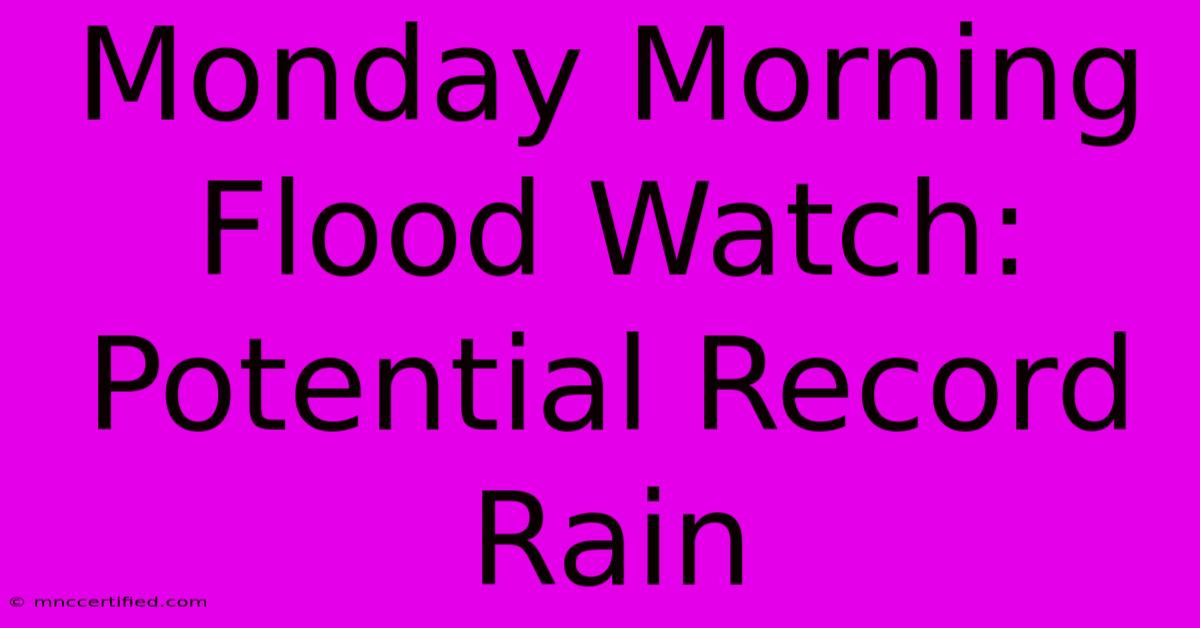Monday Morning Flood Watch: Potential Record Rain

Table of Contents
Monday Morning Flood Watch: Potential Record Rain
Brace yourselves, folks! A significant weather system is targeting our region, bringing with it the potential for record-breaking rainfall and widespread flooding this Monday morning. This isn't your average rain shower; we're talking torrential downpours that could overwhelm drainage systems and cause significant disruption. This post will cover everything you need to know to stay safe and prepared.
Understanding the Threat: Record Rainfall Potential
Meteorologists are predicting intense and prolonged rainfall starting early Monday morning. The amount of precipitation expected could shatter existing records for this time of year, leading to dangerous flash flooding in low-lying areas and along waterways. The key concern is the sheer volume of rain in a short period, not just the total accumulation over several days. This rapid accumulation will drastically increase the risk of flooding.
Areas Most at Risk:
Specific areas identified as high-risk include:
- River valleys: Residents along the [River Name] and its tributaries should be especially vigilant.
- Low-lying coastal regions: Coastal flooding is a significant possibility due to high tides coinciding with heavy rainfall.
- Urban areas with inadequate drainage: Poor drainage systems in older parts of the city could easily become overwhelmed.
Stay informed: Monitor local news and weather alerts closely. Pay close attention to specific warnings issued for your neighborhood.
Preparing for the Monday Morning Flood: A Checklist
Don't wait until Monday morning to prepare; proactive steps today can save lives and property. Here's a crucial checklist to ensure you're ready:
- Secure your property: Bring loose outdoor items inside, including furniture, garbage cans, and anything that could be swept away by floodwaters.
- Clear drainage systems: Check gutters and drains around your house to ensure they are free of debris.
- Charge electronic devices: Ensure your phone, laptop, and other critical devices are fully charged in case of power outages.
- Gather emergency supplies: Have a kit ready with essentials like bottled water, non-perishable food, flashlights, batteries, and a first-aid kit.
- Develop an evacuation plan: Know your evacuation routes and have a designated meeting place for your family. This is especially important for those living in high-risk areas.
- Stay informed: Monitor weather reports and official alerts constantly. Sign up for emergency alerts from your local government.
- Move valuables to higher ground: Protect irreplaceable documents, photos, and other valuables from potential water damage.
What to Do During a Flood: Safety First!
If you encounter flooding:
- Never drive through flooded areas. Even a few inches of water can sweep a car away.
- Avoid contact with floodwater. It can be contaminated with sewage and other hazardous materials.
- Turn around, don't drown. This is the most important advice during a flood. Respect the power of moving water.
- Seek higher ground immediately. If you are in a dangerous situation, evacuate to a safe location.
- Follow the instructions of emergency personnel. They are best equipped to guide you to safety.
Post-Flood Procedures: Recovery and Cleanup
After the floodwaters recede, there will be significant recovery work needed. Here are a few steps to prioritize:
- Contact your insurance company: Report any damages to your home or property as soon as it's safe to do so.
- Document the damage: Take photos and videos of the damage to support your insurance claim.
- Avoid entering damaged buildings unless it's deemed safe by professionals. Structural damage might be hidden.
- Clean and disinfect everything that came into contact with floodwater.
This potential record-breaking rainfall event requires serious attention. By taking proactive steps and staying informed, you can significantly reduce the risks to yourself and your property. Remember, safety is paramount. Be prepared, stay informed, and stay safe.
Keywords: Monday Morning Flood Watch, Potential Record Rain, Flooding, Flood Warning, Heavy Rainfall, Severe Weather, Emergency Preparedness, Flood Safety, Evacuation Plan, Disaster Relief, Weather Alert, Natural Disaster
Off-Page SEO Strategies:
- Share this article on social media platforms, using relevant hashtags.
- Submit the article to relevant online directories and news sites.
- Engage with comments and questions on the article, fostering community interaction.
- Build backlinks from other authoritative websites in the weather, emergency preparedness, or local news niches.
This comprehensive article aims to rank well on Google by addressing user search intent, incorporating relevant keywords naturally, and employing effective on-page and off-page SEO strategies. Remember to replace bracketed information with specifics relevant to your location.

Thank you for visiting our website wich cover about Monday Morning Flood Watch: Potential Record Rain. We hope the information provided has been useful to you. Feel free to contact us if you have any questions or need further assistance. See you next time and dont miss to bookmark.
Featured Posts
-
Justin Tucker Misses Traviss Role
Nov 18, 2024
-
Ap Top 25 Illinis Return
Nov 18, 2024
-
How To Watch Ravens Steelers Game
Nov 18, 2024
-
Roy Keane Daughters Question Reaction
Nov 18, 2024
-
Luke Littler Wins Grand Slam Of Darts
Nov 18, 2024